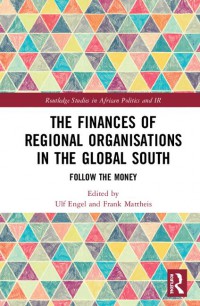The Finances of Regional Organisations in the South: Challenges of Studying A Neglected Facet of Regionalism

This book addresses a major gap in the longstanding research on regional organisations: how do their finances work and what do they reveal about the region-building process? It brings together an empirically rich collection of chapters written by experts of regional organisations in Latin America, Africa and Asia.
Based on the insights on thirteen regional organisations as well as two chapters dedicated to the influence of external funders, the editors develop typologies to cluster regional organisations according to their financial characteristics: the size of budgets, the sources of funding and the criteria to calculate contributions. Through analysing the process of budgeting and resourcing, the book sheds light on the different nature and functioning of these organisations existing outside of the Global North and puts a specific emphasis on regional organisations in the area of security in Africa and the Global South. It provides explanations to why members pay or do not pay and how budgeting works, and it deals with data availability, the role of donors, overlapping regionalism, cultural transfers between regional organisations and the impact on regional actorness.
This volume will be of key interest to scholars and students of African studies and politics, the Global South, the finances of international organisations, comparative regionalism, international political economy and international relations.
